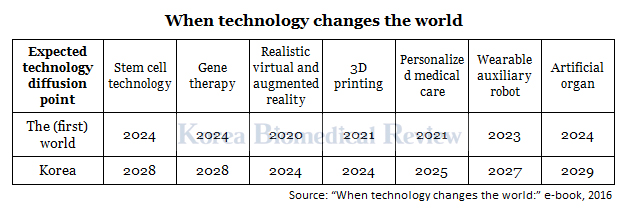Experts predict gap of 3-5 years with US, Europe and Japan
Korea will likely go ahead of Japan in reaching the diffusion point of stem cell technology but lags behind Japan in that of gene therapy, according to a research result released Monday.
Korea Institute of Science and Technology Evaluation and Planning and Science and Technology Prediction Committee jointly released the results of a research project in the form of an e-book titled “When technology changes the world.”
The researchers used the “Delphi method,” a survey technique which asks experts to answer questionnaires in two or more rounds. After each round, a facilitator or change agent provides an anonymized summary of the experts’ forecasts from the previous round, allowing them to revise their earlier answers.
The researchers analyzed 24 technologies expected to have enormous ripple effects, including virtual and augmented reality, 3D printing, personalized medical care, wearable auxiliary robot, and artificial organ.
The results showed participants predominantly predicted the United States would be the first to reach the “technology diffusion point,” marked by criteria such as the number of users and technical completeness.
In particular, the spread point of stem cell technology (when stem cell treatment can be used to treat 10 kinds of intractable diseases clinically), and the diffusion point of gene therapy technology (when two or more gene therapy products to treat multiple diseases gain approvals from U.S. FDA, European EMA and Japan PMDA) is likely to reach Korea in 2028, four years later than advanced countries.

In the case of stem cells, 58.3 percent of participants expected that the U.S. would be the first to reach diffusion point, with the rest pointing toward Japan (20.5 percent), Korea (9.2 percent), China (7.1 percent), and EU (5 percent).
Regarding gene therapy, 72.6 percent of participants expected the U.S. to reach the diffusion point first, with others predicting China and Japan (8.5 percent), the EU (5.1 percent) and Korea (4.7 percent).
In particular, researchers predicted the proliferation of gene therapy products would ultimately change the pharmaceutical industry by shifting the focus to small-scale but technologically sophisticated pharmaceutical companies.
"In the future, the pharmaceutical industry will be reorganized, and small pharmaceuticals companies with highly advanced gene therapy technology will become the key players," researchers said. "We expect medical institutions will also become research-oriented to develop gene therapy techniques for implementing personalized precision medicine and providing related procedures."
Researchers believe it is necessary to establish a stem cell research and development complex to spread stem cell technology.
"Gene therapy is possible only when a cooperative system between hospitals and pharmaceutical companies is established for quick proliferation. It is necessary to first build and operate a collaborative system with the aim of commercializing one or two gene therapy products,” they said.
The researchers noted that stem cell research is currently being carried out in a small number of research centers.
“To develop and spread stem cell technology, however, a separate research facility is needed to conduct research on a long-term and stable basis,” they said. “To this end, it is also necessary to replenish infrastructure for joint research and production complexes, commercializing technology transfer, and joint commercial production."

